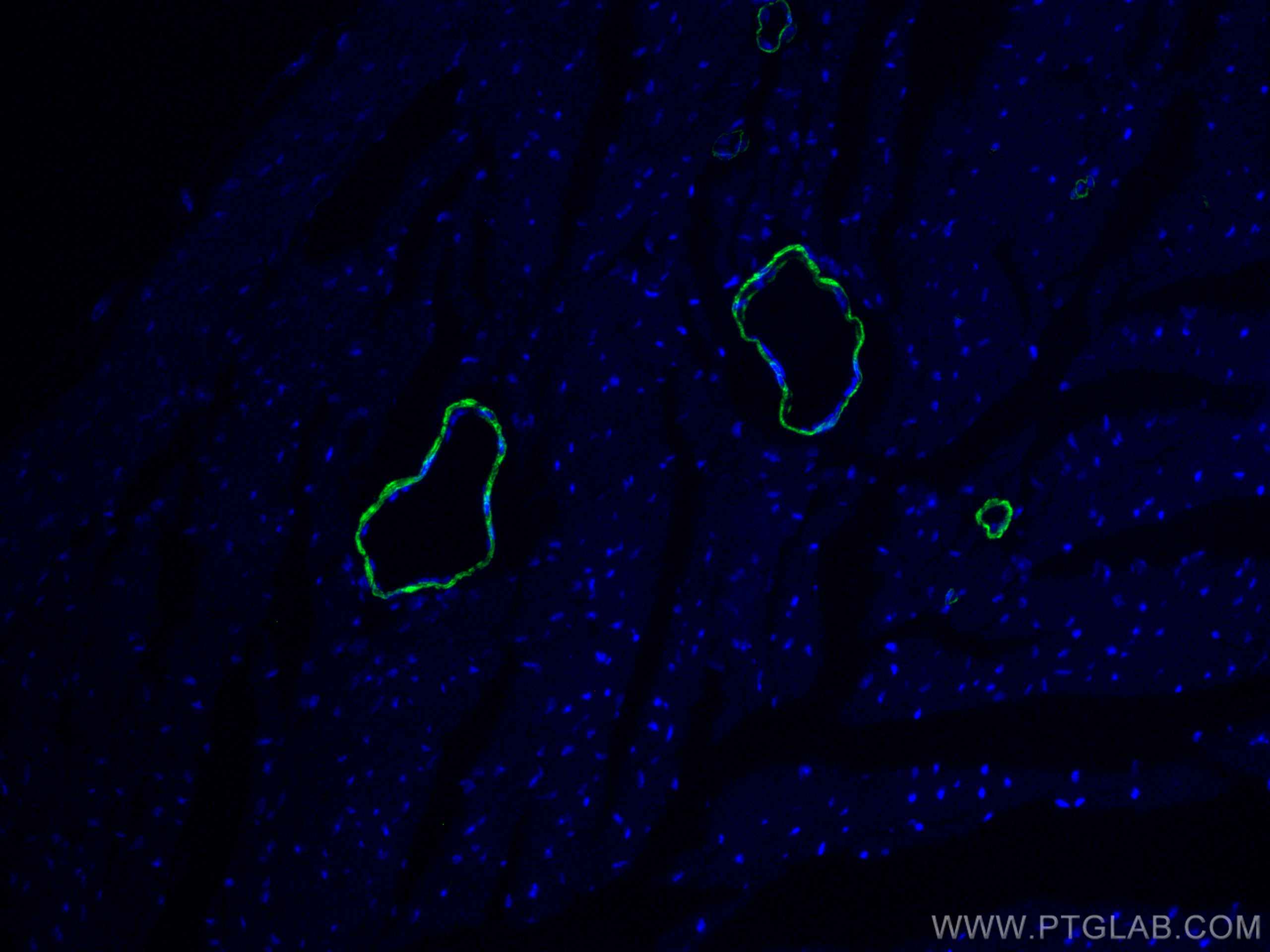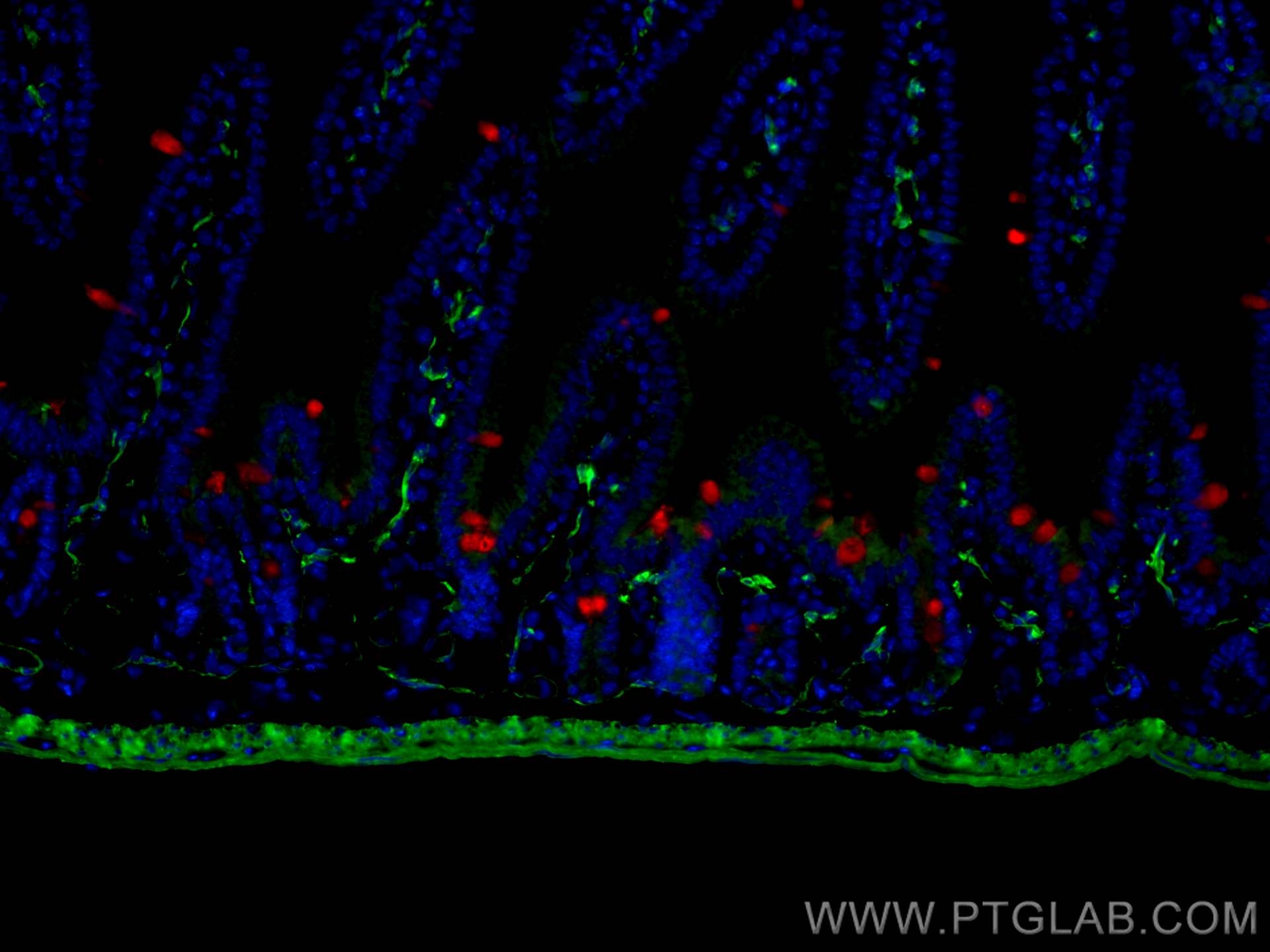Tested Applications
| Positive IF-P detected in | mouse heart tissue, mouse small intestine tissue |
Recommended dilution
| Application | Dilution |
|---|---|
| Immunofluorescence (IF)-P | IF-P : 1:50-1:500 |
| It is recommended that this reagent should be titrated in each testing system to obtain optimal results. | |
| Sample-dependent, Check data in validation data gallery. | |
Published Applications
| IF | See 6 publications below |
Product Information
CL488-14395 targets Alpha smooth muscle actin in IF-P applications and shows reactivity with human, mouse, rat samples.
| Tested Reactivity | human, mouse, rat |
| Cited Reactivity | mouse, rat |
| Host / Isotype | Rabbit / IgG |
| Class | Polyclonal |
| Type | Antibody |
| Immunogen |
CatNo: Ag5886 Product name: Recombinant human ACTA2 protein Source: e coli.-derived, PGEX-4T Tag: GST Domain: 1-377 aa of BC017554 Sequence: MCEEEDSTALVCDNGSGLCKAGFAGDDAPRAVFPSIVGRPRHQGVMVGMGQKDSYVGDEAQSKRGILTLKYPIEHGIITNWDDMEKIWHHSFYNELRVAPEEHPTLLTEAPLNPKANREKMTQIMFETFNVPAMYVAIQAVLSLYASGRTTGIVLDSGDGVTHNVPIYEGYALPHAIMRLDLAGRDLTDYLMKILTERGYSFVTTAEREIVRDIKEKLCYVALDFENEMATAASSSSLEKSYELPDGQVITIGNERFRCPETLFQPSFIGMESAGIHETTYNSIMKCDIDIRKDLYANNVLSGGTTMYPGIADRMQKEITALAPSTMKIKIIAPPERKYSVWIGGSILASLSTFQQMWISKQEYDEAGPSIVHRKCF Predict reactive species |
| Full Name | actin, alpha 2, smooth muscle, aorta |
| Calculated Molecular Weight | 377 aa, 42 kDa |
| Observed Molecular Weight | 43 kDa |
| GenBank Accession Number | BC017554 |
| Gene Symbol | Alpha smooth muscle actin |
| Gene ID (NCBI) | 59 |
| RRID | AB_2919090 |
| Conjugate | CoraLite® Plus 488 Fluorescent Dye |
| Excitation/Emission Maxima Wavelengths | 493 nm / 522 nm |
| Excitation Laser | Blue laser (488 nm) |
| Form | Liquid |
| Purification Method | Antigen affinity purification |
| UNIPROT ID | P62736 |
| Storage Buffer | PBS with 50% glycerol, 0.05% Proclin300, 0.5% BSA, pH 7.3. |
| Storage Conditions | Store at -20°C. Avoid exposure to light. Stable for one year after shipment. Aliquoting is unnecessary for -20oC storage. |
Background Information
ACTA2 (also known as α-smooth muscle actin or α-SMA) belongs to the actin family. Actins are highly conserved proteins that are involved in various types of cell motility and are ubiquitously expressed in all eukaryotic cells. ACTA2 is primarily expressed in vascular smooth muscle and anti-ACTA2 is commonly used to marker smooth muscle cells. This antibody may cross-react with other isoforms of actins.
Protocols
| Product Specific Protocols | |
|---|---|
| IF protocol for CL Plus 488 Alpha smooth muscle actin antibody CL488-14395 | Download protocol |
| Standard Protocols | |
|---|---|
| Click here to view our Standard Protocols |
Publications
| Species | Application | Title |
|---|---|---|
Cell Metab Myocardial infarction accelerates the progression of MASH by triggering immunoinflammatory response and induction of periosti | ||
Nat Commun ACSS2 protects against alcohol-induced hepatocyte ferroptosis through regulation of hepcidin expression | ||
Front Med Targeting deubiquitinase OTUB1 protects vascular smooth muscle cells in atherosclerosis by modulating PDGFRβ | ||
Regen Biomater Magnetic fibrin nanofiber hydrogel delivering iron oxide magnetic nanoparticles promotes peripheral nerve regeneration | ||
Exp Eye Res Reduced microRNA-5572 in thyroid eye disease orbital fibroblasts promotes fibrosis by targeting F2RL2 | ||
Diabet Med Mouse islet-derived stellate cells are similar to, but distinct from, mesenchymal stromal cells and influence the beta cell function |






